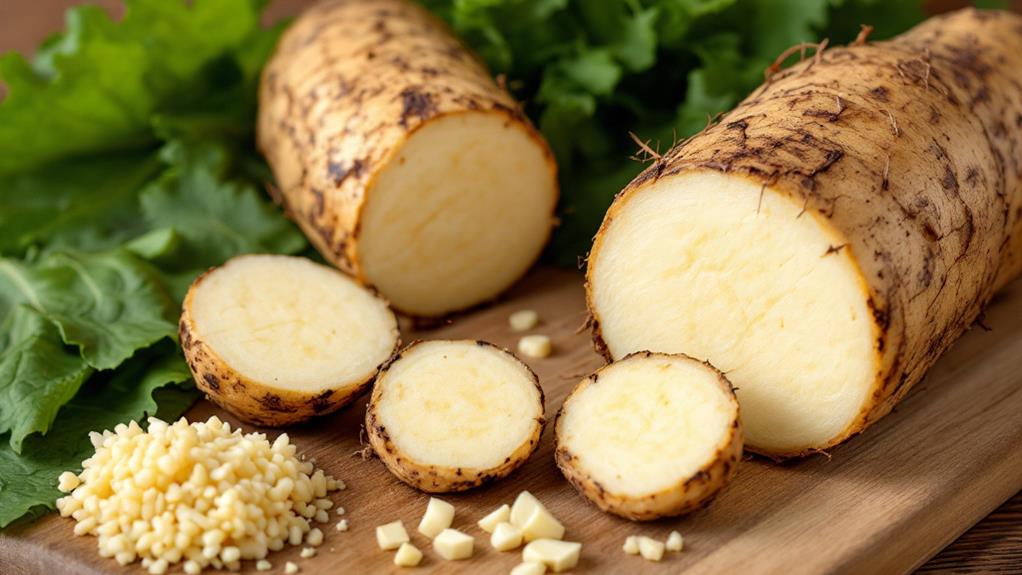Everything You Need to Know About Pineapples: Nutrition and Benefits

Pineapples are a delicious, low-calorie treat packed with vitamin C and manganese, essential for immune support and metabolism. One cup provides 78.9 mg of vitamin C and 1.53 mg of manganese. They're full of dietary fiber for digestive health, along with bromelain, an enzyme that eases inflammation and aids protein digestion. Rich in antioxidants, pineapples lower chronic disease risks and support weight management with their high water content. Mind potential allergies and be cautious if you have kidney issues due to high potassium levels. Incorporate pineapples into your meals and uncover even more of their impressive benefits and uses.
Pineapple Nutrition Facts
When you enjoy a cup of fresh pineapple, you're indulging in a deliciously low-calorie treat with just 82 calories. This tropical fruit is not only invigorating but also packed with nutrition. Pineapple provides an impressive 78.9 mg of vitamin C per cup, which covers 88% of your daily value. This vital nutrient supports your immune health and contributes to better skin health.
Moreover, pineapple is a significant source of manganese. With 1.53 mg per cup, it meets 109% of the DV for women and 66% for men. Manganese is important for bone health and metabolic functioning. Another nutritional benefit is the 2.3 grams of dietary fiber found in each serving. This fiber content aids in promoting digestive health and regularity, making pineapple a smart choice for those looking to support their gut health.
In addition, pineapple contains antioxidants, compounds that help protect your body from damage caused by free radicals. This tropical fruit also offers trace amounts of copper and potassium, enhancing its comprehensive nutrient profile. Enjoy this lively fruit as a tasty and nutritious enhancement to your diet, contributing to both immune and digestive health.
Health Benefits Overview
Beyond its delightful taste, pineapple offers a wealth of health benefits that make it a wise improvement to your diet. Packed with vitamin C, pineapple contributes a whopping 88% of your daily value per cup, supporting immune function and promoting lively skin health. The fruit's low-calorie nature, at just 82.5 kcal per cup, guarantees you get vital vitamins and minerals without the guilt, making it an excellent choice for maintaining a healthy weight.
Pineapple is famous for bromelain, an enzyme with impressive anti-inflammatory benefits. Bromelain can help reduce pain and swelling, particularly benefiting those suffering from arthritis. Furthermore, the high fiber content in pineapple aids digestion and improves nutrient absorption, guaranteeing your body gets the most out of the food you eat.
Antioxidants, such as flavonoids and phenolic compounds found in pineapple, combat oxidative stress, potentially lowering your risk of chronic diseases like heart disease and cancer. These powerful antioxidants work tirelessly to keep your cells healthy and functioning effectively. By incorporating pineapple into your diet, you're not just enjoying a tasty treat, but also bolstering your comprehensive health with its numerous benefits.
Digestive and Weight Benefits

While pineapples offer numerous health benefits, their impact on digestion and weight management is particularly significant. The enzyme bromelain found in pineapples aids in protein digestion, which can be especially beneficial for those experiencing digestive issues or pancreatic insufficiency. By improving protein digestion, bromelain boosts overall digestive health.
Pineapples are also rich in dietary fiber, providing about 2.3 grams per cup. This fiber promotes regularity and supports your digestive system, helping to prevent constipation and maintain a healthy gut. Furthermore, the fruit's high water content further aids in digestion, keeping things moving smoothly.
When it comes to weight management, pineapples are your ally. Their low calorie count and high water content make them an excellent choice for those looking to control their weight. The combination of fiber and water helps you achieve feelings of fullness, reducing the likelihood of overeating. Furthermore, the natural sweetness of pineapples can help curb cravings for unhealthy snacks, encouraging healthier eating habits.
Including pineapples in your diet can contribute to a balanced and effective approach to maintaining digestive health and managing your weight, making them a valuable enhancement to your daily routine.
Culinary Uses and Tips
Pineapple is a remarkably versatile ingredient that improves both sweet and savory dishes. You can incorporate this tropical fruit into smoothies, salads, grilled meats, and even desserts like pineapple upside-down cake. Fresh pineapple is a great supplement to your culinary arsenal, offering a burst of flavor that can raise simple recipes into something extraordinary.
Besides its delicious taste, pineapple juice works wonders as a natural meat tenderizer. Thanks to bromelain, a protein-breaking enzyme, it makes an ideal marinade for your favorite cuts of meat. When you're selecting ripe pineapples, choose ones that emit a sweet aroma and feel heavy for their size. Avoid those with soft spots or bruises to guarantee maximum freshness.
Once you've got your ripe pineapple, you'll want to know some storage tips. If you cut pineapple, store it in the refrigerator where it'll stay fresh for 5-7 days. Whole pineapples, on the other hand, should be kept at room temperature for up to 2-3 days. With these tips, you can enjoy this versatile fruit in a variety of recipes, taking full advantage of its culinary uses all year round.
Potential Risks and Considerations

When enjoying pineapple, it's important to be aware of potential risks. For some, a pineapple allergy could cause reactions, though it's rare. Moderation in consumption is vital, especially if you're on beta-blockers or have kidney issues. Pineapple's high potassium intake might be harmful for you, so avoid overindulgence. If you have gastroesophageal reflux disease (GERD), the fruit's acidity could exacerbate discomfort, leading to irritation. Watch out for digestive issues like diarrhea from eating too much pineapple.
If you're taking medications, especially blood thinners, be cautious. Pineapple can interact with medications, so it's wise to consult a healthcare provider to avoid any adverse effects. While fresh pineapple offers many health benefits, canned versions often come with added sugars, potentially diminishing these benefits. Opt for fresh pineapple to keep your diet healthier and sugar levels in check.




